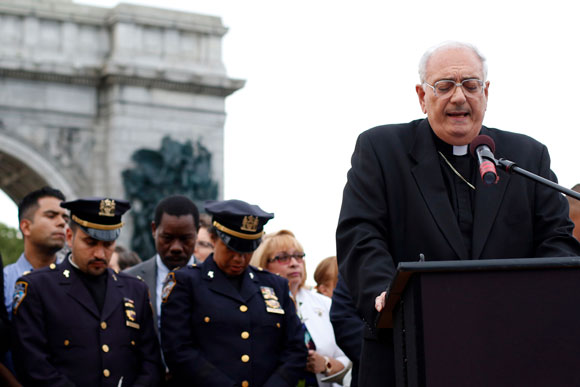
My dear brothers and sisters in the Lord,
Last week, under the leadership of the communication office of the Diocese of Brooklyn, a solidarity rally was held at Grand Army Plaza in Park Slope, where we brought together the community, especially the New York City Police Department and our African-American members, in an effort to pray together for peace and calm in the present situation.
The ecumenical ceremony brought together representatives of the major religions: Catholic, Protestant, Jewish, Buddhist, Sikh and Islamic. Prayer in times of crisis is always important, not only as we petition God for peace and calm, but also as we come to better understand our own feelings and motivations so that we can act with the calm and peace necessary for a peaceful society.
As we look to the facts of the matter, the unfortunate deaths in close succession of Philando Castile in Minnesota and Alton Sterling in Louisiana resulted in spontaneous demonstrations protesting police violence and perhaps stereotyping. The unfortunate incident in Dallas where five police officers were assassinated occasioned the solidarity rally that was organized by the Diocese of Brooklyn.
And just this past weekend, we saw three more officers ambushed and assassinated in Baton Rouge, one of whom was an African American. Three other officers were shot and one is still fighting for his life. We see that the issue of violence against our police is also an important matter.
Our Diocese in Brooklyn and Queens is unique in the country, since we have the most black Catholics, an estimate of 215,000 was recently made by the Center for Applied Research in the Apostolate (CARA). Many are Haitian, West Indian and African-Americans. Our rally brought many of our black parishioners together and I was heartened to see their participation.
Trying to understand the feelings of the black community for white Americans is not an easy task. Recently, statistics have come forth during this time of crisis that approximately 640 persons are killed by police each year in the United States, of which less then one-third are black Americans. It would seem that, while at the same time black Americans number about 13 to 14 percent of our population, there seems to be disproportionate representation of black Americans in this number.
The facts not withstanding, it is the feelings and the perceptions of our black community that needs attention. When we recognize that mutual respect is the basis of civilized society, we must recognize the feelings of those who share membership in our society. If others feel mistreated, we must take their feelings seriously if we are to have real solidarity in our society. We cannot simply argue facts we must also address perceptions of injustice. There is no easy answer to creating a unified body of citizens in our country. It is still unfortunate that we refer to one another by the color of our skin. Racism prevents us from seeing a person’s true value. We still have a long way to go in our society to a time when we will truly be color-blind and person-centered.
Our police-community vigil was a small step in that direction. Msgr. Robert Romano, offered a prayer for the safety of our Nation’s police officers. In addition to diverse members of our community, hundreds of police officers attended the vigil, including NYPD chaplain Msgr. David Cassato, and FDNY Chaplain Msgr. John Delendick, as well as several members of our clergy.
Each day the work of police officers puts them in the line of fire. They leave their homes and their families every day and they are not sure that they will return at the end of their tour of duty. We need support for our law enforcement officers. We cannot expect them to perform at optimal levels without community support.
The eradication of racism and all of its manifestations in our society is truly an exercise in putting out into the deep waters of history and present practice. Alone we cannot accomplish this great task. However, with God’s help all things are possible. Join me as we continue to pray for all in our society that we can come closer together, overcoming the racial barriers that separate us.
